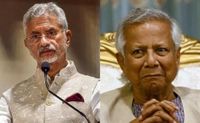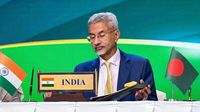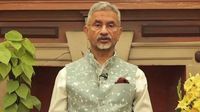In a significant diplomatic exchange, External Affairs Minister (EAM) S. Jaishankar has strongly countered remarks made by Bangladesh's Chief Advisor Muhammad Yunus regarding India's Northeast region. Yunus, during his recent visit to China, claimed that the Northeast is a "landlocked" area and positioned Bangladesh as the "only guardian of the ocean for all this region." Jaishankar's response on April 3, 2025, emphasized that cooperation among nations is not about selective engagement, stating, "cooperation is an integrated outlook, not one subject to cherry-picking."
While no official confirmation exists regarding a bilateral meeting between Prime Minister Narendra Modi and Yunus, the two leaders were seated next to each other at the BIMSTEC (Bay of Bengal Initiative for Multi-Sectoral Technical and Economic Cooperation) leaders' dinner on the same evening. Jaishankar addressed the 20th BIMSTEC Ministerial Meeting in Bangkok, where he highlighted India's Northeast as an emerging connectivity hub, boasting a vast network of roads, railways, waterways, grids, and pipelines. He described the completion of the Trilateral Highway as a potential game-changer, connecting the Northeast to the Pacific Ocean.
Jaishankar pointed out that India has the longest coastline in the Bay of Bengal, stretching nearly 6,500 kilometers, and shares borders with five BIMSTEC members. He asserted that India plays a crucial role in facilitating the smooth flow of goods, services, and people within the region. "We are conscious that our cooperation and facilitation are an essential prerequisite for the smooth flow of goods, services, and people in this larger geography," he said, reiterating the importance of comprehensive collaboration.
Yunus's comments, made during his four-day visit to China, suggested that the seven states of Northeast India, often referred to as the "seven sisters," lack access to the ocean. He expressed that Bangladesh could serve as a vital link for these states, framing the situation as an opportunity for economic expansion. "This opens up a huge possibility. So this could be an extension of the Chinese economy," Yunus remarked, advocating for increased collaboration with Beijing.
Jaishankar's rebuttal underscores India's strategic interests in the region, particularly concerning access to the Northeast states through the "Chicken's Neck" corridor in north Bengal. This narrow stretch of land has historically posed challenges for India, both economically and strategically. Yunus's remarks have been interpreted as an attempt to leverage Bangladesh's position in relation to India's Northeast, raising concerns in New Delhi.
Political reactions to Yunus's statements have been swift. Assam Chief Minister Himanta Biswa Sarma condemned the comments as "offensive," while former Manipur Chief Minister N. Biren Singh accused Bangladesh of treating the Northeast as a "strategic pawn." Sarma emphasized the need for robust infrastructure development around the Chicken's Neck corridor, warning that Yunus's comments could revive discussions about severing this critical passageway.
Jaishankar's statements reflect India's commitment to fostering regional cooperation through BIMSTEC. He reiterated that the organization has seen increasing attention and energy devoted to strengthening its framework over the past decade. The EAM's remarks aim to reaffirm India's role as a central player in regional connectivity and economic integration.
Yunus's visit to China was marked by the signing of nine agreements, including a significant $2.1 billion financial package aimed at enhancing Bangladesh's economic ties with China. His discussions with Chinese President Xi Jinping included a call for Beijing to assume a greater role in ensuring Bangladesh's stability.
Historically, India has relied on access to Bangladesh's ports, particularly Chittagong, for trade and logistics. Under former Prime Minister Sheikh Hasina's administration, India was granted access to the Chittagong Port via Tripura's Sabroom sub-division, located just 75 kilometers from the port. This access has been vital for India's economic engagement with its northeastern states.
As tensions simmer between India and Bangladesh over these comments, the broader implications for regional cooperation and economic integration remain to be seen. Jaishankar's response highlights India's determination to assert its strategic interests while fostering collaboration within the BIMSTEC framework.
The ongoing dialogue between India and Bangladesh, particularly in light of Yunus's remarks, serves as a reminder of the complexities in regional geopolitics, where economic interests and strategic partnerships intersect. As leaders from both nations navigate this delicate landscape, the focus will likely remain on enhancing connectivity and ensuring mutual benefits for their respective populations.
In conclusion, the diplomatic exchange between Jaishankar and Yunus illustrates the intricate dynamics at play in South Asia, where access to resources and economic opportunities are fiercely contested. With both nations looking to assert their influence in the region, the path forward will require careful diplomacy and a commitment to collaborative engagement.







